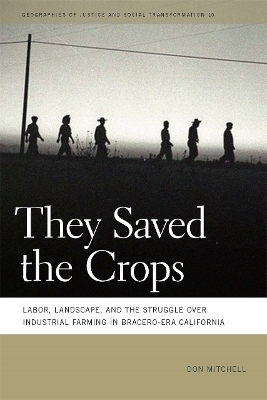
They Saved the Crops
Labor, Landscape, and the Struggle over Industrial Farming in Bracero-Era California
Seiten
2012
University of Georgia Press (Verlag)
978-0-8203-4176-7 (ISBN)
University of Georgia Press (Verlag)
978-0-8203-4176-7 (ISBN)
- Lieferbar (Termin unbekannt)
- Versandkostenfrei
- Auch auf Rechnung
- Artikel merken
Argues that by delineating the need for cheap, flexible farm labour as a problem and solving it via the importation of relatively disempowered migrant workers, an alliance of growers and government actors committed the United States to an agricultural system that is, in important respects, still in existence.
A MacArthur Award–winning scholar explores the explosive intersection of farming, immigration, and big business
At the outset of World War II, California agriculture seemed to be on the cusp of change. Many Californians, reacting to the ravages of the Great Depression, called for a radical reorientation of the highly exploitative labour relations that had allowed the state to become such a productive farming frontier. But with the importation of the first braceros—""guest workers"" from Mexico hired on an ""emergency"" basis after the United States entered the war—an even more intense struggle ensued over how agriculture would be conducted in the state. Esteemed geographer Don Mitchell argues that by delineating the need for cheap, flexible farm labour as a problem and solving it via the importation of relatively disempowered migrant workers, an alliance of growers and government actors committed the United States to an agricultural system that is, in important respects, still with us.
They Saved the Crops is a theoretically rich and stylistically innovative account of grower rapaciousness, worker militancy, rampant corruption, and bureaucratic bias. Mitchell shows that growers, workers, and officials confronted a series of problems that shaped—and were shaped by—the landscape itself. For growers, the problem was finding the right kind of labour at the right price at the right time. Workers struggled for survival and attempted to win power in the face of economic exploitation and unremitting violence. Bureaucrats tried to harness political power to meet the demands of, as one put it, ""the people whom we serve.""
Drawing on a deep well of empirical materials from archives up and down the state, Mitchell's account promises to be the definitive book about California agriculture in the turbulent decades of the mid-twentieth century.
A MacArthur Award–winning scholar explores the explosive intersection of farming, immigration, and big business
At the outset of World War II, California agriculture seemed to be on the cusp of change. Many Californians, reacting to the ravages of the Great Depression, called for a radical reorientation of the highly exploitative labour relations that had allowed the state to become such a productive farming frontier. But with the importation of the first braceros—""guest workers"" from Mexico hired on an ""emergency"" basis after the United States entered the war—an even more intense struggle ensued over how agriculture would be conducted in the state. Esteemed geographer Don Mitchell argues that by delineating the need for cheap, flexible farm labour as a problem and solving it via the importation of relatively disempowered migrant workers, an alliance of growers and government actors committed the United States to an agricultural system that is, in important respects, still with us.
They Saved the Crops is a theoretically rich and stylistically innovative account of grower rapaciousness, worker militancy, rampant corruption, and bureaucratic bias. Mitchell shows that growers, workers, and officials confronted a series of problems that shaped—and were shaped by—the landscape itself. For growers, the problem was finding the right kind of labour at the right price at the right time. Workers struggled for survival and attempted to win power in the face of economic exploitation and unremitting violence. Bureaucrats tried to harness political power to meet the demands of, as one put it, ""the people whom we serve.""
Drawing on a deep well of empirical materials from archives up and down the state, Mitchell's account promises to be the definitive book about California agriculture in the turbulent decades of the mid-twentieth century.
DON MITCHELL is Distinguished Professor of Geography Emeritus at Syracuse University and professor of cultural geography at Uppsala University in Sweden. He is the author of several books, including They Saved the Crops: Labor, Landscape, and the Struggle over Industrial Farming in Bracero-Era California (Georgia). He was a MacArthur Fellow in 1998.
| Erscheint lt. Verlag | 30.4.2012 |
|---|---|
| Verlagsort | Georgia |
| Sprache | englisch |
| Gewicht | 774 g |
| Themenwelt | Geisteswissenschaften ► Geschichte ► Regional- / Ländergeschichte |
| Naturwissenschaften ► Geowissenschaften ► Geografie / Kartografie | |
| Sozialwissenschaften ► Politik / Verwaltung ► Staat / Verwaltung | |
| Sozialwissenschaften ► Soziologie | |
| Wirtschaft | |
| ISBN-10 | 0-8203-4176-2 / 0820341762 |
| ISBN-13 | 978-0-8203-4176-7 / 9780820341767 |
| Zustand | Neuware |
| Informationen gemäß Produktsicherheitsverordnung (GPSR) | |
| Haben Sie eine Frage zum Produkt? |
Mehr entdecken
aus dem Bereich
aus dem Bereich
Erinnerungen
Buch | Softcover (2024)
Pantheon (Verlag)
CHF 22,40
Universalgelehrter, Polarreisender, Entdecker
Buch | Hardcover (2024)
mareverlag
CHF 39,20


